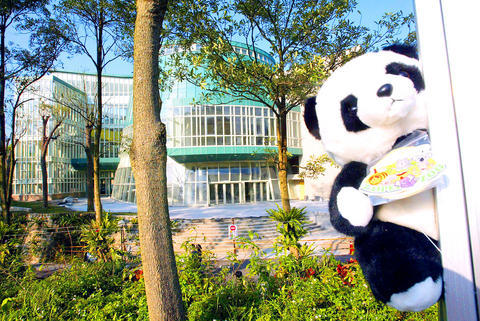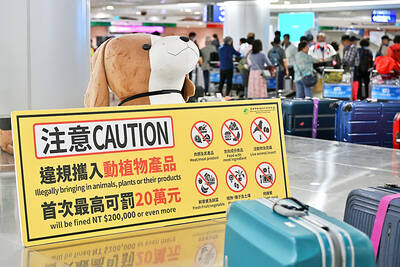The Taipei High Administrative Court yesterday rejected the Taipei City Zoo's application to import two giant pandas from China.
China offered to donate the pandas to Taiwan in 2005, shortly after a visit to China by former Chinese Nationalist Party (KMT) chairman Lien Chan (
The zoo filed an application to the Council of Agriculture shortly after Beijing first announced that it wanted to send the pandas to Taiwan, but the council rejected the application the following year, saying that the zoo did not offer adequate facilities to care for the endangered species.

PHOTO: CNA
The zoo appealed to the Cabinet, but was again turned down, after which it filed a second appeal with the Taipei High Administrative Court last year.
The court ruled that the zoo's preparations were incomplete and rejected its appeal.
The zoo had argued that the Council of Agriculture's rejection had been unfair because the zoo began training zookeepers and constructing enhanced facilities in 2005.
Zoo officials said the council should have evaluated the application in terms of whether the zoo was making the necessary preparations rather than whether the preparations were complete.
The judges said in their verdict that the Council of Agriculture's evaluation and decisions were correct.
"We respect the verdict, but we will not give up," zoo director Chen Pao-chung (
"We plan to refile the application," he said.
Taipei Mayor Hau Lung-bin (
Unlike when the zoo filed its first application, Hau said it was now fully prepared to care for the pandas.
Inspecting the three-story panda exhibition hall at the zoo yesterday, Hau said that the facility would be completed in June, and that zookeepers were undergoing training in the meantime.
The hall includes a panda nursery on the first floor, two indoor rooms and one outdoor activity room.
"Taipei City is ambitious about getting the pandas, and we hope the two pandas will have children at the zoo," he said.
The zoo has spent NT$300 million (US$9.9 million)on building the hall and has sent 17 zookeepers to the panda-breeding base in Sichuan, China, the San Diego Zoo in the US and Ueno Zoo in Tokyo to learn how to raise and breed giant pandas.
The zoo has planted 6 hectares of bamboo to feed the animals.
Besides Taipei, Hsinchu County, Taichung City and Hualien County are vying to provide a new home for pandas.
Giant pandas are among the rarest animals in the world. There are about 1,600 giant pandas in the world, most of which live in the wild in China's Sichuan Province.
ADDITIONAL REPORTING BY DPA

UKRAINE, NVIDIA: The US leader said the subject of Russia’s war had come up ‘very strongly,’ while Jenson Huang was hoping that the conversation was good Chinese President Xi Jinping (習近平) and US President Donald Trump had differing takes following their meeting in Busan, South Korea, yesterday. Xi said that the two sides should complete follow-up work as soon as possible to deliver tangible results that would provide “peace of mind” to China, the US and the rest of the world, while Trump hailed the “great success” of the talks. The two discussed trade, including a deal to reduce tariffs slapped on China for its role in the fentanyl trade, as well as cooperation in ending the war in Ukraine, among other issues, but they did not mention

Japanese Prime Minister Sanae Takaichi yesterday lavished US President Donald Trump with praise and vows of a “golden age” of ties on his visit to Tokyo, before inking a deal with Washington aimed at securing critical minerals. Takaichi — Japan’s first female prime minister — pulled out all the stops for Trump in her opening test on the international stage and even announced that she would nominate him for a Nobel Peace Prize, the White House said. Trump has become increasingly focused on the Nobel since his return to power in January and claims to have ended several conflicts around the world,

REASSURANCE: The US said Taiwan’s interests would not be harmed during the talk and that it remains steadfast in its support for the nation, the foreign minister said US President Donald Trump on Friday said he would bring up Taiwan with Chinese President Xi Jinping (習近平) during a meeting on the sidelines of the APEC Summit in South Korea this week. “I will be talking about Taiwan [with Xi],” Trump told reporters before he departed for his trip to Asia, adding that he had “a lot of respect for Taiwan.” “We have a lot to talk about with President Xi, and he has a lot to talk about with us. I think we’ll have a good meeting,” Trump said. Taiwan has long been a contentious issue between the US and China.

Taiwan’s first African swine fever (ASF) case has been confirmed and would soon be reported to the World Organization for Animal Health (WOAH), Minister of Agriculture Chen Junne-jih (陳駿季) yesterday. The Ministry of Agriculture’s Veterinary Research Institute yesterday completed the analysis of samples collected on Tuesday from dead pigs at a hog farm in Taichung and found they were ASF-positive. Animal and Plant Health Inspection Agency Animal Quarantine Division chief Lin Nien-nung (林念農) said the result would be reported to the WOAH and Taiwan’s major trade partners would also be notified, adding that pork exports would be suspended. As of Friday, all samples